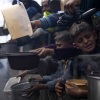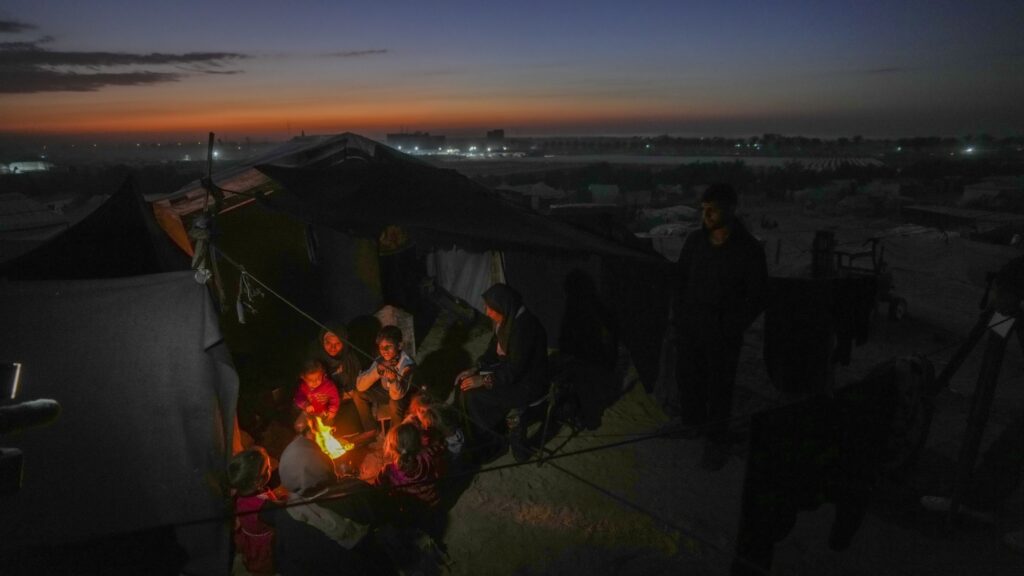
Reda Abu Zarada, 50, a evacuee from Jabaliya in northern Gaza, sits by a bonfire with her grandchildren at a seaside camp in Khan Yunis, Gaza Strip, on Thursday, December 19, 2024. Abdel Kareem Hana/AP/AP Hide caption
toggle caption
Abdel Kareem Hana/AP/AP
DEIR ALBALA, Gaza Strip — At least 20 people, including five children, were killed in Israeli military attacks across the Gaza Strip overnight and into Sunday, Palestinian medical officials said.
Meanwhile, Israeli authorities have allowed the Holy Land’s Catholic leader, Cardinal Pierbattista Pizzaballa, to enter Gaza and celebrate pre-Christmas Mass with members of the region’s small Christian community.
At least eight people, including three children, have been killed in a strike against a school housing displaced people in Gaza City, the Gaza Ministry of Health said. The Civil Defense, a first-response force attached to the Hamas-run government, previously said four children were among the dead.
The Israeli military said it carried out precision strikes against Hamas militants sheltering there.
At least eight people, including three women and two children, were killed in an attack on a house in the central city of Deir Al-Balah late Saturday, according to Al-Aqsa Martyrs Hospital, which received the bodies. A man and his wife were killed in a strike in the southern city of Khan Yunis just after midnight Sunday, according to nearby Nasser Hospital. Two people were killed in a car attack in Gaza City, the Ministry of Health said.
There was no immediate comment from the military on these attacks.

Israel has continued daily attacks in the Gaza Strip for more than 14 months since the start of its war with Hamas. The bombings, which the government says target only insurgents and hide among civilians, frequently kill women and children.
Israel and Hamas recently appeared to be moving closer to a ceasefire agreement that would include the release of Israeli hostages and Palestinian prisoners, but several hurdles remain and long-running indirect negotiations have repeatedly stalled.
Vatican envoy celebrates mass with Christians in Gaza

Pope Francis gives a blessing while exchanging seasonal greetings with Vatican staff at the Paul VI Hall in the Vatican on Saturday, December 21, 2024. Andrew Medichini/AP/AP Hide Caption
toggle caption
Andrew Medichini/AP/AP
Dozens of worshipers gathered at the Holy Family Church in Gaza City, where Pizzaballa and other clergymen celebrated mass. The Christmas tree was decorated with golden ornaments and twinkling white lights, and priests in red and white robes held candles.
“At Christmas, we celebrate light, but we wonder where that light is, and this is one of the places where it is,” Pizzaballa said.
The noise of Israeli drones circling overhead, a sound that became common throughout Gaza during the war, was heard throughout the mass.
The Latin patriarch’s unusual visit to Gaza comes a day after Pope Francis again criticized Israel’s actions in Gaza. President Francis said on Saturday that the envoy was unable to enter the territory because of Israeli bombing.
“Yesterday, children were bombed. This is an atrocity, this is not a war,” Francis said during his annual Christmas address at the Vatican.
The Pope recently called for an investigation to determine whether Israel’s actions in Gaza amount to genocide, a conclusion later reached by Amnesty International and Human Rights Watch. The International Court of Justice is investigating genocide allegations brought against Israel by South Africa.
Israel, founded as a haven for Jews after the Nazi Holocaust, categorically rejects such claims. The government has gone to great lengths to rescue civilians and insists it is only fighting Hamas, which it blames for genocidal violence in the attacks that sparked the war.
The war intensifies as winter sets in

Reda Abu Zalada wraps herself and her grandchildren in blankets as they prepare to sleep in a tent at the Khan Yunis camp in the Gaza Strip on Thursday, December 19, 2024. Abdel Kareem Hana/AP/AP Hide caption
toggle caption
Abdel Kareem Hana/AP/AP
Hamas-led militants entered southern Israel in a surprise attack on October 7, 2023, killing about 1,200 people, mostly civilians, and abducting about 250 others. About 100 hostages remain in Gaza, at least a third of whom are believed to be dead.
The ensuing Israeli shelling and ground invasion have killed more than 45,000 people in Gaza, more than half of them women and children, according to the Gaza Ministry of Health, which does not distinguish between combatants and civilians in its tally.
The attacks caused widespread destruction and forced about 90% of Gaza’s 2.3 million people to flee, in some cases multiple times. Hundreds of thousands of people are crammed into rough tent camps along the coast as the cold, wet winter sets in.
Israel has been conducting a major operation in northern Gaza since early October, fighting Hamas in the most isolated and worst-hit areas of the territory. Tens of thousands of people were evacuated as the military ordered a general evacuation and barely allowed humanitarian aid into the country.
The Israeli military agency that oversees Gaza’s civil administration, known as COGAT, facilitated the evacuation of more than 100 patients, caregivers and others from the dysfunctional Kamal Adwan and Al-Awda hospitals in the far north. announced. COGAT said it also facilitated the delivery of 5,000 liters of fuel and food to the hospital.



